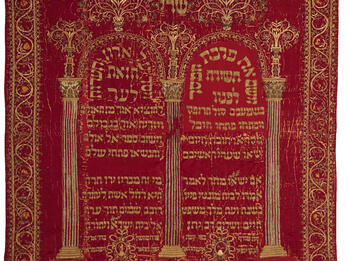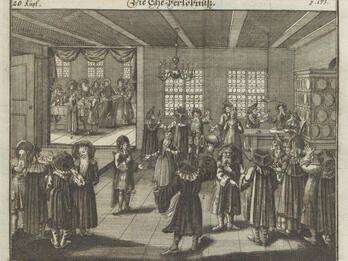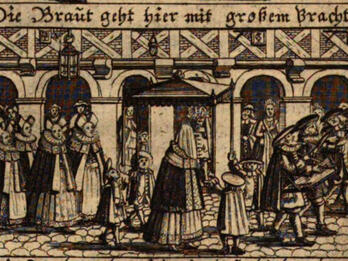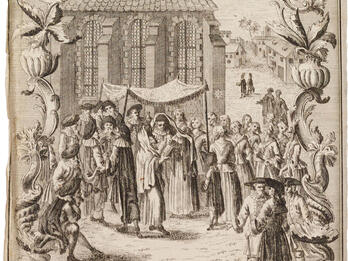Pesak (Decision): On a Secret Marriage
At a sitting of three judges we the undersigned sat as a court on the fourth day of the month of Adar 2 in the year 5376 [1616] here in Vercelli after permission was given to us from his excellency the dayan [judge], may he succeed, when there came before us the young man, his honor, Odeh Ya, son of his honor R. Gabriel Norzi, may the Rock preserve him, who was summoned upon our command by the warden. We threatened him by means of an oath, with a Torah scroll open before him at the chapter of the admonitions from Deuteronomy [Deuteronomy 28:15ff.], so that he could see it. We admonished him greatly, that he must not make a false statement nor any kind of fraud regarding everything we would ask of him concerning his claim of the betrothal, that he betrothed the maiden Miss Yoshti, daughter of Mr. Yekutiel Segal, may the Rock preserve him. Rather, he must respond with the innocent truth about every single detail. In order to bring to light the absolute truth and resolve the mystery, we asked him many questions and inquiries, for it appeared to us that the matter demanded this. Thus, we present our inquiries and his responses (in question and answer form). Instead of leaving a blank page we will fill it with scratches and ink:
When did this betrothal take place, in what year, which month, what day of the month, which day of the week, and at what hour of the day?
In this year, in the month of Shevat, on the 23rd of the month, on a Sunday after evening prayers.
In what place did the matter occur?
Close to the ladder that ascends to the synagogue.
Who was with you in that place?
R. David Oseimo and R. Joseph Pavia, who were called for this purpose.
Was anything said to the aforementioned maiden at some point before she was betrothed?
That she should wait a little until he arrived.
Did he arrange with her beforehand that she should be in that place to receive the betrothal, and that is why she came?
The arrangement with her was that she should be in the courtyard of the synagogue so they could conclude what they had agreed between them.
Did he tell her explicitly that he wanted to betroth her?
A neighbor told her.
How did he enter into conversation with her about this betrothal?
On occasion, in the house when he was speaking with her he heard her say that she does not want to marry her cousin with whom they wanted to match her, and therefore he asked her to marry him, and she agreed.
What did he marry her with?
With a gold ring.
Had she seen that ring before?
She saw it at that point, in the presence of the witnesses.
Did he buy it with his money or with money that she gave him?
He bought it with his money, from his personal fund.
What things did he say to her at the time of the betrothal?
First he asked her if she was firm in her intention, and wholeheartedly wished to accept the betrothal from him, as she had sworn to him many times, and she answered that yes she fully intended to do so, and this is what she wanted.
Did she place any condition for accepting this betrothal?
She said that she wished to accept it with her uncle’s consent.
Did he marry her on this condition?
He answered that he did not want the betrothal to be under any condition, and if she wanted to accept it unconditionally, fine, but if not, she should return home in peace.
What did she answer to this statement?
That if he did not want there to be any condition, she would agree to his wishes, and she was content to accept it without any condition.
What did he do next?
He directed the witnesses to listen to what she said and that they too should ask question and ascertain her wishes.
What did the witnesses do then?
Rabbi David, one of the witnesses, told her to be very careful, because by accepting this betrothal she would no longer have the right to retract, and that even if her uncle and her relatives were not reconciled to the match, she would be betrothed in any event.
What did she answer to this statement of R. David?
That this was her wish, because she was entitled and had the right to do what she wished, and no one could object.
Did the second witness, R. Joseph, say anything to her before the betrothal?
He also said that after the betrothal she could not change her mind, even if her uncle was not reconciled to it.
How did she respond to this comment of the second witness?
In the same manner that she answered the first witness.
What did he do after that?
He showed the ring to the witnesses and then placed it on her hand and said to her: “You are hereby betrothed to me by this ring, in accordance with the law of Moses and Israel.”
Did he say, “You are hereby betrothed,” before or after giving her the ring?
He said it exactly at the moment when he gave the ring.
Did the witnesses hear him say that formula?
They certainly heard it.
Did he tell them to listen closely?
Yes, he said that to him.
Did he say, “You are hereby betrothed to me” out loud?
He said it out loud.
After receiving the ring, what did she do with the ring and what did she say?
She put it away, said nothing, and went home right away.
Did he explicitly reveal the matter to those witnesses beforehand, or were they innocently called upon?
He did not say the matter explicitly but rather that they should come with him to be witnesses about some matter. They did not know what it concerned until he began to go into the details with the maiden on that day in their presence. It is possible that he had earlier revealed the matter in secret to R. David, but he does not remember for certain. In any case, he made the two of them swear that they would not reveal the matter that he wanted from him.
Were both of the witnesses together from the beginning of the action to the end?
They were together at the same time from the beginning to the end.
Does he have other witnesses to the betrothal?
He has no other witnesses other than those two.
Did they give their testimony in writing?
They signed and gave to him.
Did they give more than a single testimony in writing?
At first, he brought a single testimony written by his hand, which he had written after she agreed with him to be in that place and accept the betrothal. However, that version did not include all the details of the matter, which occurred between them at the time of the betrothal. Rather, it simply stated that the man So-and-So betrothed the woman So-and-So, as is customary. The witnesses initially signed this document, because he did not have another deed that described the event itself. At the time he told the witnesses to sign that testimony as a memorandum until the following day, when he would write for them a testimony recounting precisely what had happened, and they would sign it in accordance with the truth, and they agreed to do so.
Did he bring the second testimony to them for signing on the following day?
He brought them a prepared form which R. David copied in his own hand, and both of them signed it, but they were not together.
What did he then do with the first testimony?
He tore it up.
Did he tear it in front of the witnesses or inform them before they signed the second one that he intended to tear it?
He told them from the start, when they were signing, that he intended to tear it, and he reiterated that to them at the time of the second signing.
Did R. Joseph read the second testimony before signing it?
He showed it to him before R. David copied it, so that he could read it, which he did after R. David wrote it out, and thus he read it before signing it.
Why did he make the witnesses swear they would not reveal the matter to anyone?
Because he thought he could conclude the matter with the agreement of the parties, and therefore he did not want them to reveal it before he had employed measures to this end.
Did he give anything to the maiden before they arrived at this stage?
He gave her one stokeo and some bindeili that she told him to buy for her, which he gave to her as a gift.
Was anyone there when he gave her those things?
There was no one present.
This concludes the account of what we asked and what the aforementioned Mr. Odeh Ya Norzi answered about the above business on the above day. We have appended our signatures, by our very own hands; everything is confirmed and established.
Joseph ben Michael Ravena, of blessed memory, judge
Mordecai ben Eliezer Segel, of blessed memory, judge
Jacob Baki ben Samson, of blessed memory, judge
Translated by
.
Credits
Joseph Ravena, “Pesak (Decision): On a Secret Marriage” (manuscript, Italy, 1617; MS 933, National Library of Israel, Jerusalem). Published in: Abraham Ḥayyim Freimann, Seder kidushin ve-nisu’in (Jerusalem: Mosad ha-Rav Kook, 1944/45; repr., 1964), pp. 143–149.
Published in: The Posen Library of Jewish Culture and Civilization, vol. 5.






